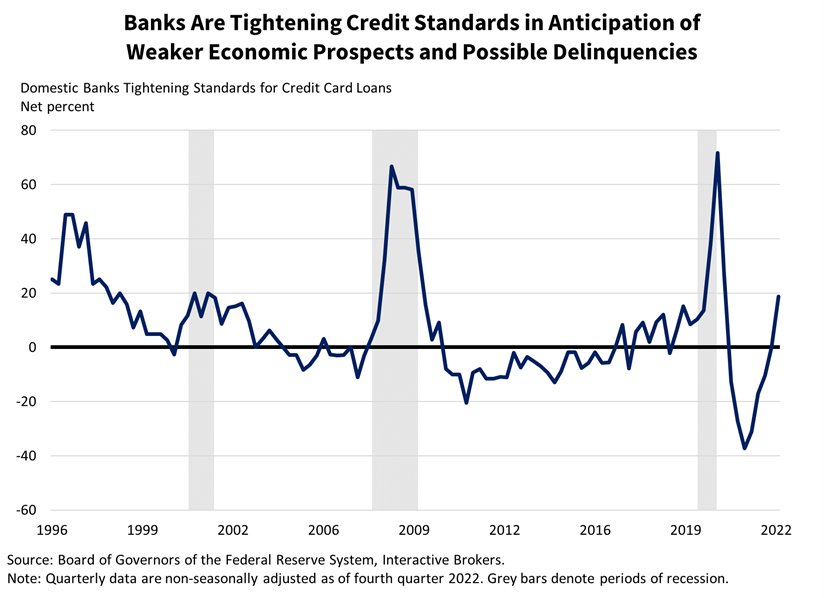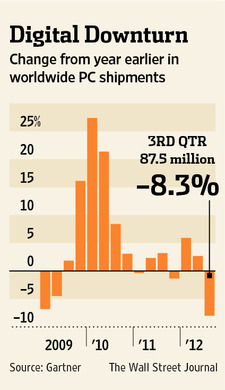By; Jose Torres, Interactive Brokers’ Senior Economist
The Consumer Sentiment Index for November plummeted to 54.7, much worse than market expectations of 59.5 and a sharp decline from October’s 59.9 level. The dramatic decline offsets half of the recovery from this June’s low of 50, the worst reading since the survey began in 1952. This month’s reading reflects broad weakening across all categories and implies that consumers are feeling the pain of inflation, rising interest rates and tighter credit conditions.
Pessimism among consumers may be a positive for the Federal Reserve’s (the Fed) inflation battle with today’s data implying that Americans are ready to tighten their purse strings, yet in my view, it also implies that the economy is heading for a recession next year rather than a soft landing.
Importantly, sentiment regarding the economy, purchasing conditions and inflation worsened.
Economic Conditions
Sentiment for current economic conditions declined from 65.6 in October to 57.8. Consumers aren’t feeling warm and fuzzy about the future either, with sentiment concerning future economic conditions declining from 56.2 to 52.7. Sentiment tanked across diverse age groups, educational attainment levels, income levels, geographies and political affiliations. Global economic growth deceleration and midterm election uncertainty were cited as reasons that weighed on overall sentiment.
Purchasing Conditions
Purchasing conditions for durable goods worsened significantly and weighed the most on the headline number. The one-two punch of higher financing costs and higher prices has hampered demand for durable goods, leading to rising inventories. Banks are also tightening credit conditions, which isn’t helping sentiment. Consumers who don’t satisfy incrementally rigid credit requirements when attempting to make a large purchase are likely to feel dejected.

Additionally, supply chain challenges from Chinese lockdowns continue to weigh on production, materials, labor and transportation, propelling prices higher. The potential easing of Chinese lockdowns reported today, if sustained, may help temper inflation longer term through supply chain efficiency gains. In the short term, however, it’s likely to propel inflation higher as it will increase demand for commodities, especially oil and gas whose prices remain very high amidst tight supplies. Oil and natural gas are up 4% and 3% in early trading today in response to the news about Chinese lockdowns.
Inflation
Consumers are expecting inflation next year to be 5.1%, up from the 5.0% expectation recorded last month. Consumers are expecting longer term inflation over the next five years to settle closer to the Fed’s 2% target at 3%, up from 2.9% last month.
A Potentially Rocky Road Ahead
While today’s data implies consumer demand may weaken, which can help soften future price gains, the low sentiment is consistent with economic downturns, strengthening the case for a hard landing next year. While most recent recessions have been accompanied by higher joblessness, the coming downturn will be characterized by an affordability sting for consumers. Overall, this report points to a tapped-out consumer that is likely to weaken further into next year.
This post first appeared on November 11th, 2022 on the IBKR Traders’ Insight blog
PHOTO CREDIT: https://www.shutterstock.com/g/lightspring
Via SHUTTERSTOCK
DISCLOSURE: INTERACTIVE BROKERS
The analysis in this material is provided for information only and is not and should not be construed as an offer to sell or the solicitation of an offer to buy any security. To the extent that this material discusses general market activity, industry or sector trends or other broad-based economic or political conditions, it should not be construed as research or investment advice. To the extent that it includes references to specific securities, commodities, currencies, or other instruments, those references do not constitute a recommendation by IBKR to buy, sell or hold such investments. This material does not and is not intended to take into account the particular financial conditions, investment objectives or requirements of individual customers. Before acting on this material, you should consider whether it is suitable for your particular circumstances and, as necessary, seek professional advice.
The views and opinions expressed herein are those of the author and do not necessarily reflect the views of Interactive Brokers LLC, its affiliates, or its employees.
Any trading symbols displayed are for illustrative purposes only and are not intended to portray recommendations.
In accordance with EU regulation: The statements in this document shall not be considered as an objective or independent explanation of the matters. Please note that this document (a) has not been prepared in accordance with legal requirements designed to promote the independence of investment research, and (b) is not subject to any prohibition on dealing ahead of the dissemination or publication of investment research.



